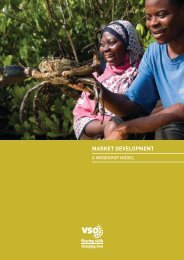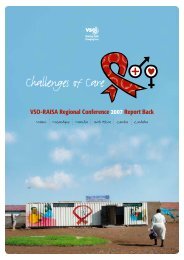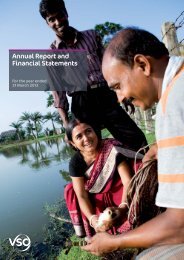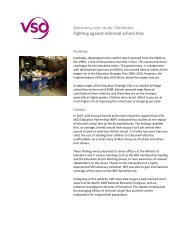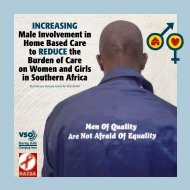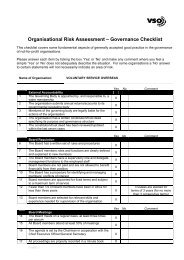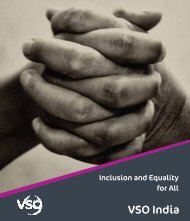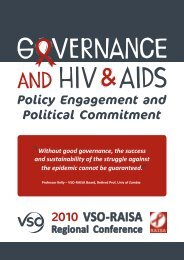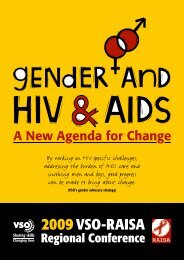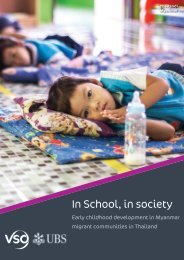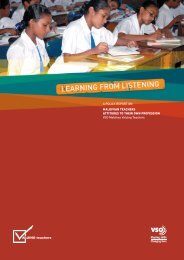parents have every support necessary to realise girls’rights to education. This has been accomplished in someareas through <strong>the</strong> provision of cash transfers andpensions for families affected by HIV and AIDS. 207 Ifnecessary, <strong>the</strong>se social protection interventions caninclude positive conditions so that families can claimfinancial support to allow <strong>the</strong>ir daughters to stay in school.Both primary and secondary care providers areincreasingly denied <strong>the</strong>ir right to recreation and leisuretime because of <strong>the</strong> overwhelming care responsibilities<strong>the</strong>y face. The intense time, financial and mentalcommitment of providing care also mean that careproviders often lose <strong>the</strong>ir right to participate incommunity activities or decision-making platforms. Thisis often exacerbated by <strong>the</strong> discrimination that careproviders face from some members of society, ei<strong>the</strong>rbecause <strong>the</strong>y are living with HIV and AIDS or because<strong>the</strong>y are caring for someone else living with <strong>the</strong> illness.As highlighted in Chapter 2, women and girls’ politicalparticipation is crucial to improving health systems. Asmentioned earlier, <strong>the</strong> regulation of work performed bycare providers, including limits on <strong>the</strong> number ofpatients <strong>the</strong>y support in a day and <strong>the</strong> numbers ofhours <strong>the</strong>y work, would go a long way to ensure careproviders’ right to leisure and recreation. This wouldalso allow time for care providers to play a more visiblerole in community life, perhaps creating moreopportunity to break down stigma and discrimination.The physical and psychological impact ofproviding careIn addition to, and partly as a result of, <strong>the</strong> costs ofproviding care outlined above, women care providersexperience a wide range of psychological impacts from<strong>the</strong>ir work that violate <strong>the</strong>ir right to favourableconditions of work. Caring for and <strong>the</strong>n watching largenumbers of people die from AIDS-related illnessespushes most care providers to <strong>the</strong> extremes ofemotion, stress and depression. A care provider inSouth Africa recently explained <strong>the</strong> psychologicalimpact providing care can have:“I feel like a balloon, I am full of air in <strong>the</strong> morning andas <strong>the</strong> day goes by, <strong>the</strong> air disappears little by littleuntil what’s left is a crumpled piece of rubber.” 208This is a stark image of what is happening to individualcare providers in countries with high HIV and AIDSprevalence, where care providers have little or noaccess to counselling, support or training. In Lesotho,for example, 90% of community care providers arereported to be clinically depressed. 209 In <strong>the</strong> absence ofany external psychological support, care providers inSouth Africa report that <strong>the</strong>y are talking to each o<strong>the</strong>r insupport groups and sharing experiences in order tocope. 210 Much more work needs to be done to providespecific counselling and psychosocial sessions for careproviders. Governments, specifically, must introduce orrevive mental health programmes at <strong>the</strong> primary carelevel to help community care providers deal with <strong>the</strong>psychological stress of providing care.The scant training received by care providers exacerbates<strong>the</strong>ir stress. As noted before, lack of training can affect acare provider’s ability to claim a stipend (as is <strong>the</strong> case inSouth Africa), but it also significantly affects <strong>the</strong> standardof care received by <strong>the</strong> sick. Fur<strong>the</strong>rmore, it may place<strong>the</strong> care provider herself at risk. Care providers cannotoperate effectively and safely if <strong>the</strong>y are not well trained, if<strong>the</strong>y are not properly supervised and mentored, and if<strong>the</strong>y are not embedded within referral systems that allow<strong>the</strong>m to help people <strong>the</strong>y are caring for get access socialand medical services. Although it is beyond <strong>the</strong> scope ofthis paper to detail <strong>the</strong> specific components of training, 211supervision and referral systems, it is absolutely essentialto clarify that <strong>the</strong> absence of such support will decrease<strong>the</strong> quality of care provided, demoralise care providers,and lead to turnover and unsustainability.Most government training for care providers is basednear urban centres and frequently costs more moneyand time than a care provider or even a CBO canafford. There is sometimes peer-to-peer training amongsecondary care providers. However, this occurs lessoften with primary care providers, especially girls, whoseldom have access to support groups or o<strong>the</strong>r careproviders. Home-based care organisations have a dutyto ensure regular training on home-based care for allstaff by an accredited trainer. Care providers shouldhave full access to information on vertical transmission,post-exposure prophylaxis, adherence and treatmentliteracy. This training should also be targeted at primarycare providers by building secondary care providers’skills to provide outreach training to primary careproviders. For example, in Ahitipaluxene inMozambique, <strong>the</strong> carers receive on-<strong>the</strong>-job training from<strong>the</strong> nurse who works with <strong>the</strong>m. Those who havereceived training mentioned that <strong>the</strong>y feel moreappreciated and have greater confidence whileperforming <strong>the</strong>ir work duties:“It [<strong>the</strong> training] was very important. That iswhy I say that it is forbidden to forget whatwe learnt.” 212Even when care providers manage to acquire propertraining, <strong>the</strong>ir work is often physically dangerous46 <strong>Walking</strong> <strong>the</strong> talk putting women's rights at <strong>the</strong> heart of <strong>the</strong> HIV and AIDS response
ecause <strong>the</strong>y do not have access to <strong>the</strong> equipment<strong>the</strong>y need, such as home-based care kits. InMozambique, home-based care kits cost 2,000meticais each (US$78) – more than care providers earnin a month. 213 In Ethiopia, around 70% of respondentsin a recent study said that <strong>the</strong>y do not receive a full kitfrom <strong>the</strong>ir associations and have to replace essentialitems such as soap and painkillers <strong>the</strong>mselves. 214 Basicequipment such as gloves and home-based kitsincluding soap, detergent, disinfectants and antisepticsetc are essential and should be provided by <strong>the</strong>government. Secondary care providers would alsobenefit from having a work uniform. Not only would thisenhance perceptions of <strong>the</strong>ir work as a profession, butit would increase <strong>the</strong>ir recognition and standing amonghospital staff.The stigma of HIV and AIDS also adds considerablestress to care providers, whe<strong>the</strong>r or not <strong>the</strong>y <strong>the</strong>mselvesare living with HIV and AIDS. Care providers sometimeshave to provide care to a patient secretly, so as not toexpose <strong>the</strong> patient to discrimination. O<strong>the</strong>r careproviders report being isolated by <strong>the</strong>ir communities andcreating, in response, <strong>the</strong>ir own ‘families’ of careproviders and people living with HIV and AIDS. Societywidecampaigns to tackle stigma may tackle <strong>the</strong>problem in <strong>the</strong> long-term but governments, donors andNGOs should also seek to develop or build <strong>the</strong> capacityof care providers’ associations and support groups,which create important peer support for care providers.It is amazing that despite <strong>the</strong>se incredible levels ofstress and psychological trauma associated with caring,women care providers seem to be able to carry on.South African care givers, some of <strong>the</strong> few who doreceive a stipend for <strong>the</strong>ir work, report that <strong>the</strong>re arethree things that help to keep <strong>the</strong>m going:“One, despite being a very stressful job, caregiving gives <strong>the</strong>m <strong>the</strong> satisfaction of being ableto help those in need. Second, it gives <strong>the</strong>msome form of financial resource, howevermeagre <strong>the</strong> stipend is. Third, it gives <strong>the</strong>m skillsand <strong>the</strong> opportunity to hone <strong>the</strong>m throughcontinuous practice.” However, it is “<strong>the</strong> popularsaying, ‘wathinta abafazi, wathinta imbokodo’(you strike a woman, you strike a rock) thatcomes to mind as probably <strong>the</strong> simplestexplanation of how <strong>the</strong>se women keep onproviding care despite <strong>the</strong> odds.” 215As this chapter has shown, women and girls facerepeated violations of <strong>the</strong>ir rights when trying to accesscare and support services, and as a result of <strong>the</strong>ir roleas care providers. Donors, governments, multilateralorganisations and civil society all have a role to play inredressing <strong>the</strong>se violations.5.5. Recommendations Donor governments1) Donors should increase support to countrygovernments to introduce social protectionmeasures, financial support for primary careproviders and build <strong>the</strong> capacity of grassrootswomen’s organisations, support groups andnetworks of women living with HIV and AIDS todevelop income-generation initiatives, microcreditschemes, local employment and education/training opportunities for women and girls.2) Donors should increase capacity-building supportto organisations of women and girls living with HIVand AIDS to enable <strong>the</strong>m to develop skills aroundmanagement, leadership, group dynamics, teambuilding, community mobilisation, advocacy andself-empowerment. Support should also be givento official bodies with a male bias to increasefemale membership and leadership within <strong>the</strong>irorganisations.<strong>Walking</strong> <strong>the</strong> talk putting women's rights at <strong>the</strong> heart of <strong>the</strong> HIV and AIDS response 47




